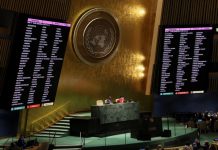A human rights advocacy group says a Saudi military court has sentenced a senior prince and former commander of Saudi-led coalition forces in Yemen to death on charges of an attempted coup to oust King Salman and his son, Crown Prince Mohammed bin Salman, who is the defense minister and the de facto ruler of the kingdom.
The Washington DC-based Institute for Gulf Affairs, citing a relative speaking on condition of anonymity, reported that the ruling has been passed on Fahd bin Turki bin Abdulaziz.
The source is said to have revealed text messages he received from a former senior official in Riyadh, confirming the charges of “treason” and the death sentence.
Fahd bin Turki was arrested last September on corruption charges, along with his son Abdulaziz, who was the deputy governor of al-Jawf region at the time.
Bin Turki, who joined the Saudi army in 1983, received special operations training in the United States and the United Kingdom. He was promoted to the rank of general before his dismissal and arrest last year.
The institute also said it had obtained “dozens of secret Saudi documents detailing the transfer of more than 100 residential plots of land in Riyadh to bin Turki’s four sons.”
The leaked documents from the Saudi Ministry of Justice indicate that nearly one square kilometer of land was granted to bin Turki’s four sons in 2014 during the reign of their grandfather, King Abdullah bin Abdulaziz.
The source in the report also added that Princess Abeer, the late Saudi king’s daughter, has been in exile in Scotland since before the arrest of her husband Fahd bin Turki and son last year.
He noted that Abeer controls billions of dollars in various properties around the world.
The source added that the death sentence was an attempt to recover the money.
Back in November 2017, dozens of Saudi princes, ministers and former ministers were detained and placed in a luxury hotel under tight security guard over allegations of money laundering, bribery, extorting officials, and misappropriation of public funds for personal benefits.
The detentions had been ordered by Saudi Arabia’s so-called Anti-Corruption Committee headed by bin Salman, in a crackdown widely believed to be aimed at consolidating his power.
The majority of those high-profile figures later agreed to monetary settlements in exchange for their freedom and paid colossal sums of money.
The purge followed an earlier roundup of Muslim clerics, writers, economists, and public figures.
Ever since bin Salman became Saudi Arabia’s de facto ruler in 2017, the kingdom has arrested dozens of activists, bloggers, intellectuals and others perceived as political opponents, showing almost zero tolerance for dissent even in the face of international condemnations.
Muslim scholars have been executed, women’s rights activists have been put behind bars and tortured, and freedom of expression, association and belief continue to be denied in the ultraconservative kingdom.









